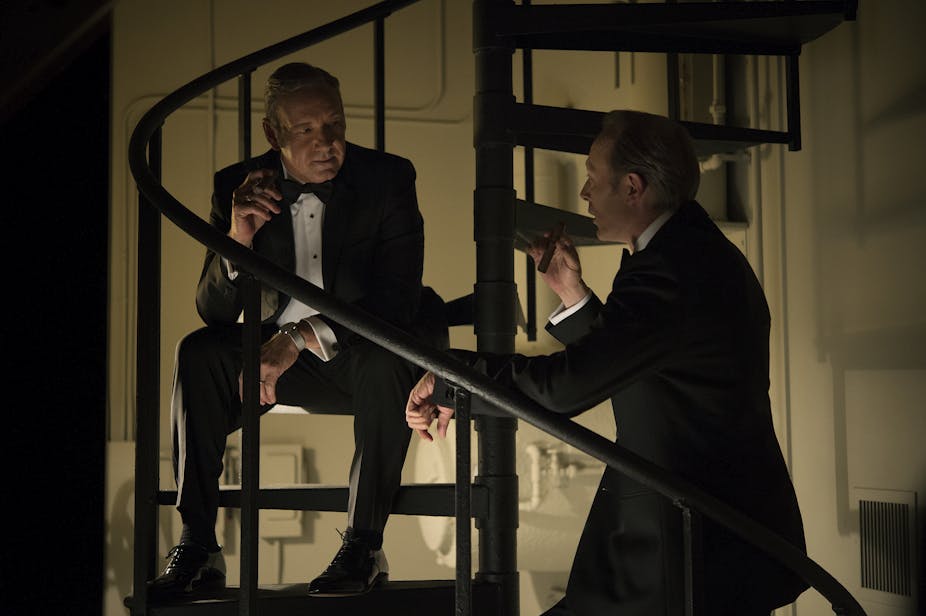I just spent a weekend binge-watching the third season of the lethally addictive Netflix show House of Cards – which dramatises the fraught relations the US has with its restive and violent global rival, the Russian Federation.
Some have called the new season’s portrayal of Russia superficial, and not very up to date, and it certainly falls back on a lazy stereotypes.
But the depiction of Russia is actually rather astute. In a show as prominent as this, it’s the mark of a major shift in the way Russia is seen in the West. It also does a lot to flatter Vladimir Putin’s ego.
Back in the game
House of Cards’ previous seasons, which predated the worst of the Ukraine crisis, gave most of the geopolitical action over to the rise of China, while Russia was depicted as a rather weak and uncivilised power. But in season three, Russia is portrayed as a strong player in the international arena, led by a strong authoritarian power figure.
The whole season focuses on the West’s relations with Russia, and American attempts to grapple with the personality of a fictional Russian president. The fictional antagonist’s resemblance to Vladimir Putin is striking: Viktor Petrov shares Putin’s initials, his belligerent outlook, and his penchant for wrestling bears and riding horses bare-chested. Both are also ruthless men with a tendency to act impulsively.
As a result of its behaviour throughout 2014, Russia is seen now in the public sphere in the US but also in Europe as a great power with the potential to pose a direct threat to the West. And while House of Cards features a fictional crisis in the Jordan valley rather than Ukraine, it still presents Russia not as a corrupt basket-case falling apart at the seams, but as the biggest obstacle in the US president’s quest to assure peace in the Middle East.

The show also clearly takes the view that global peace won’t be secured until America treats Russia as an equal – arguably another lesson of the last two years, which have seen Russia make a dramatic effort to recoup its “great power” status.
Besides fuelling the Ukraine crisis, Putin has had a central role mediating the Syrian crisis, and Russia is deeply involved in the Iranian nuclear negotiations. Putin has also mirrored the US’s “pivot” towards Asia by cultivating stronger relations with both China and India.
And much as in reality, in House of Cards the US and Russia do not trust each other. Russia is presented as not trusting the West for its failed promises, such as not to enlarge NATO or not to place the anti-missile shield in Central and Eastern Europe. On the other hand, the Russian president is presented as a strong leader but also an impulsive thug whose words cannot be taken at face value.
As the show frames it, this mutual mistrust stems from a clash between Russian and Western political systems. The producers hint that American democracy makes it much harder for leaders to take swift decisions without being questioned. In turn, Russian leaders are not bound by democratic rules or institutions, but by the will of the people, who can quickly and violently overthrow a leader who goes too far.
The big leagues
House of Cards’ Russian diplomats are far more versatile and effective than their sluggish American counterparts, skilled at misleading foreign leaders and foiling their plots – much as in real life, Russian diplomacy has generally had the initiative in the Ukraine crisis.
American and European diplomats reacted rather slowly and indecisively to Russia’s actions in Ukraine, and seemed disinclined to co-operate as closely as was clearly needed. The famous leaked 2014 conversation in which American diplomat Victoria Nuland concisely summarised her position as “fuck the EU” certainly didn’t help Brussels’ diplomatic image.
And in a reflection of that unedifying reality, House of Cards leaves European diplomatic efforts and the EU’s role in dealing with Russia out completely. Geopolitics in the show remains a very polarising affair.
This is very interesting since in the previous seasons, Europe still got some credit as a natural and somewhat equal partner of the US in world politics. The absence of the EU from the picture is not particularly surprising given the union’s perhaps unfair reputation for toothlessness.
But then again, Europe and China’s might reflect an uneasy American sense that the world is becoming increasingly bipolar, and ruled once again by hard power. The still-rumbling Ukraine crisis has revealed a new level of assertiveness in Russian foreign policy. During 2014, Vladimir Putin essentially managed to restore Russia back to the great power status he clearly thinks is its destiny.
Many outside Russia of course think this renewed heft has been bought at an outrageous cost, but Putin and his regime have managed to show that Russia is unwilling to compromise any longer, and that it is ready to challenge the supremacy of the West.
Russia’s reappearance as a serious antagonist in the most popular political drama in the US is a serious victory for Putin, as for the past decade he has been arguing that Russia should be treated as equal by the West and complaining about denigration and belittlement.
And after years spent exhorting the virtues of soft power, Western diplomats must be watching House of Cards with gloom.

